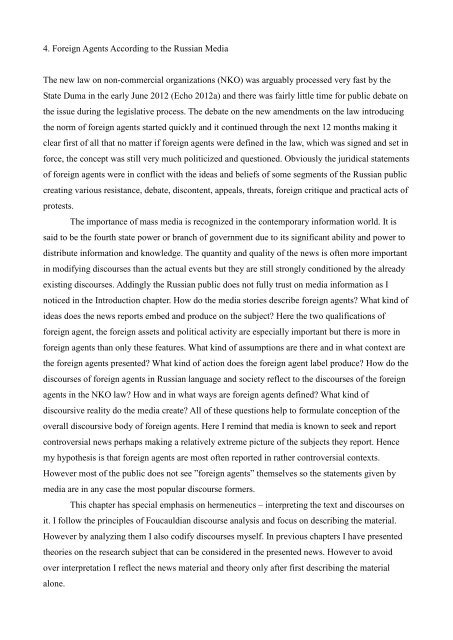Foreign Agents in Russia - Doria
Foreign Agents in Russia - Doria
Foreign Agents in Russia - Doria
You also want an ePaper? Increase the reach of your titles
YUMPU automatically turns print PDFs into web optimized ePapers that Google loves.
4. <strong>Foreign</strong> <strong>Agents</strong> Accord<strong>in</strong>g to the <strong>Russia</strong>n Media<br />
50<br />
The new law on non-commercial organizations (NKO) was arguably processed very fast by the<br />
State Duma <strong>in</strong> the early June 2012 (Echo 2012a) and there was fairly little time for public debate on<br />
the issue dur<strong>in</strong>g the legislative process. The debate on the new amendments on the law <strong>in</strong>troduc<strong>in</strong>g<br />
the norm of foreign agents started quickly and it cont<strong>in</strong>ued through the next 12 months mak<strong>in</strong>g it<br />
clear first of all that no matter if foreign agents were def<strong>in</strong>ed <strong>in</strong> the law, which was signed and set <strong>in</strong><br />
force, the concept was still very much politicized and questioned. Obviously the juridical statements<br />
of foreign agents were <strong>in</strong> conflict with the ideas and beliefs of some segments of the <strong>Russia</strong>n public<br />
creat<strong>in</strong>g various resistance, debate, discontent, appeals, threats, foreign critique and practical acts of<br />
protests.<br />
The importance of mass media is recognized <strong>in</strong> the contemporary <strong>in</strong>formation world. It is<br />
said to be the fourth state power or branch of government due to its significant ability and power to<br />
distribute <strong>in</strong>formation and knowledge. The quantity and quality of the news is often more important<br />
<strong>in</strong> modify<strong>in</strong>g discourses than the actual events but they are still strongly conditioned by the already<br />
exist<strong>in</strong>g discourses. Add<strong>in</strong>gly the <strong>Russia</strong>n public does not fully trust on media <strong>in</strong>formation as I<br />
noticed <strong>in</strong> the Introduction chapter. How do the media stories describe foreign agents? What k<strong>in</strong>d of<br />
ideas does the news reports embed and produce on the subject? Here the two qualifications of<br />
foreign agent, the foreign assets and political activity are especially important but there is more <strong>in</strong><br />
foreign agents than only these features. What k<strong>in</strong>d of assumptions are there and <strong>in</strong> what context are<br />
the foreign agents presented? What k<strong>in</strong>d of action does the foreign agent label produce? How do the<br />
discourses of foreign agents <strong>in</strong> <strong>Russia</strong>n language and society reflect to the discourses of the foreign<br />
agents <strong>in</strong> the NKO law? How and <strong>in</strong> what ways are foreign agents def<strong>in</strong>ed? What k<strong>in</strong>d of<br />
discoursive reality do the media create? All of these questions help to formulate conception of the<br />
overall discoursive body of foreign agents. Here I rem<strong>in</strong>d that media is known to seek and report<br />
controversial news perhaps mak<strong>in</strong>g a relatively extreme picture of the subjects they report. Hence<br />
my hypothesis is that foreign agents are most often reported <strong>in</strong> rather controversial contexts.<br />
However most of the public does not see ”foreign agents” themselves so the statements given by<br />
media are <strong>in</strong> any case the most popular discourse formers.<br />
This chapter has special emphasis on hermeneutics – <strong>in</strong>terpret<strong>in</strong>g the text and discourses on<br />
it. I follow the pr<strong>in</strong>ciples of Foucauldian discourse analysis and focus on describ<strong>in</strong>g the material.<br />
However by analyz<strong>in</strong>g them I also codify discourses myself. In previous chapters I have presented<br />
theories on the research subject that can be considered <strong>in</strong> the presented news. However to avoid<br />
over <strong>in</strong>terpretation I reflect the news material and theory only after first describ<strong>in</strong>g the material<br />
alone.
















